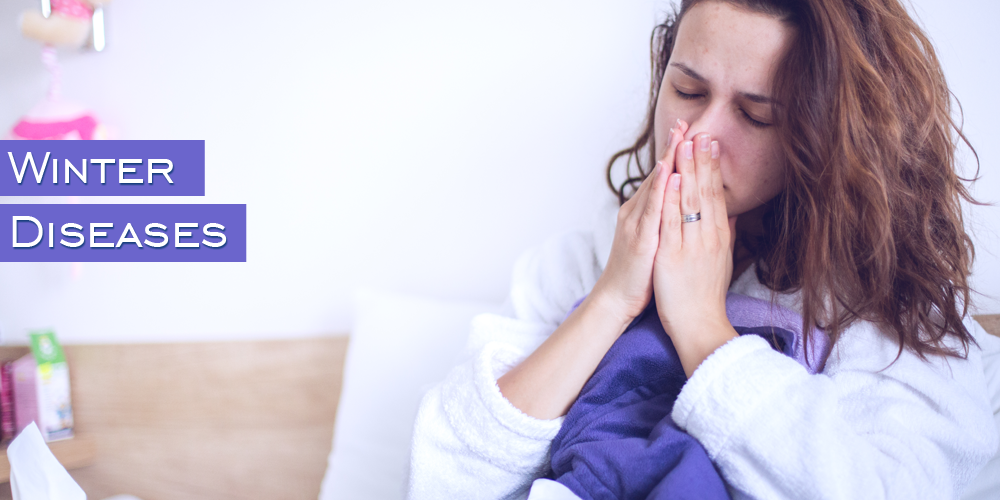As we welcome the weather of foggy mornings and chilly evenings we are happy to get a break from the otherwise hot Mumbai climate. Winter is almost there in India and it’s the time to rejoice! It’s the season of endless cups of “Adrak chai” and strong coffee. It is also that time of the year filled the approaching holidays and the wedding season. However for many the winter season brings a lot of diseases with the onset of low temperatures.
During winters, the body heat usually experiences a drop as the environment cools. At the same time, the body is adjusting to the new climate. As a result, the change in the process is demonstrated through a number of diseases. While some people are more susceptible to catching these common diseases most can be avoided by just a few precautions:
Some common winter diseases in India:
Colds and Flu: Contrary to popular belief, cold and flu symptoms are not a direct result of falling temperatures. Many individuals suffer from bacterial or viral induced cold and flu symptoms resulting from a compromised immune system. In the winter, when temperatures begin to fall, the body naturally begins to work in overdrive to regulate the normal body temperature. Try to offset this by layering the body in a variety of warm clothes which will help your body in regulating the body temperature. Flu generally gets transmitted through the air in the environment. Yet, keeping yourself shielded from chilling winds is always helpful.
Coughs: The dust, dryness and cold winds in the winter all add to cough symptoms. Having beverages of extreme temperatures also triggers a throat infection. Always wear a helmet or use scarves to protect yourself from the dust while rising two wheelers.
Itchy skin: A lot of people with sensitive skin develop itchy during winter. The best way to take care of this is by applying coconut, olive or almond oil every night. Cold temperature with low humidity results in this.
Headache: Cold winds sometimes play havoc on your head. Hence, shield yourself with a warm muffler or scarf. If you drive a two-wheeler in India, invest in a good helmet and a muffler if you want to stay away with persistent headaches during winter.
Respiratory ailments: In the winter season, the air molecules become thinner and more restricted. As a result, individuals suffering from respiratory conditions, such as asthma or COPD, may find it increasingly difficult to breathe during extreme cold temperatures. To negate this effect, when venturing into the outdoors, layering the face and chest in warm clothing and scarves will help. For some individuals, however, the winter season brings about a change in activity requiring a limitation to only indoor events. The cold and dry air leads to tightening of airways and makes it even worse while breathing. Making some changes can surely be helpful. Keep your homes smoke free as smoke can travel even through closed doors.
Heart Attacks: Most of us are unaware of the fact that winters is one of the prime seasons for heart attacks. As the temperature falls, the arteries become constricted making it difficult for the heart to pump the blood. Experts suggest, people over the age of 30 should avoid exhausting themselves in winter season. Also, do not overeat food during winters and preferably eat in small quantities.
Joint Pain: There is no scientific evidence to joint pains in winter season but there are many people who do suffer from the pain in winter. One of the most common remedies to get relief from joint pains is keeping yourselves and your feet warm. Also, wear two or three pairs of thin clothing instead of one pair of heavy warm clothes. Exercising is another way to get rid of all joint and muscle stiffness during winter time without overdoing it. Basking in the sun is also a great way to get rid of the joint aches.
Sinusitis: Congestion, headaches, coughing, running nose as well as post nasal drip symptoms make people feel miserable during winters. Sinus problems occur when homes are closed and there is no proper ventilation. To stay clear of sinusitis this season, make sure you get enough rest, eat healthy, drink plenty of fluids and avoid dust.
Winter is the season of fun and celebration. Don’t let yourself down with one of the diseases that keeps you away from experiencing these joys. Some precautions can keep these diseases at bay to get most out of this season.


